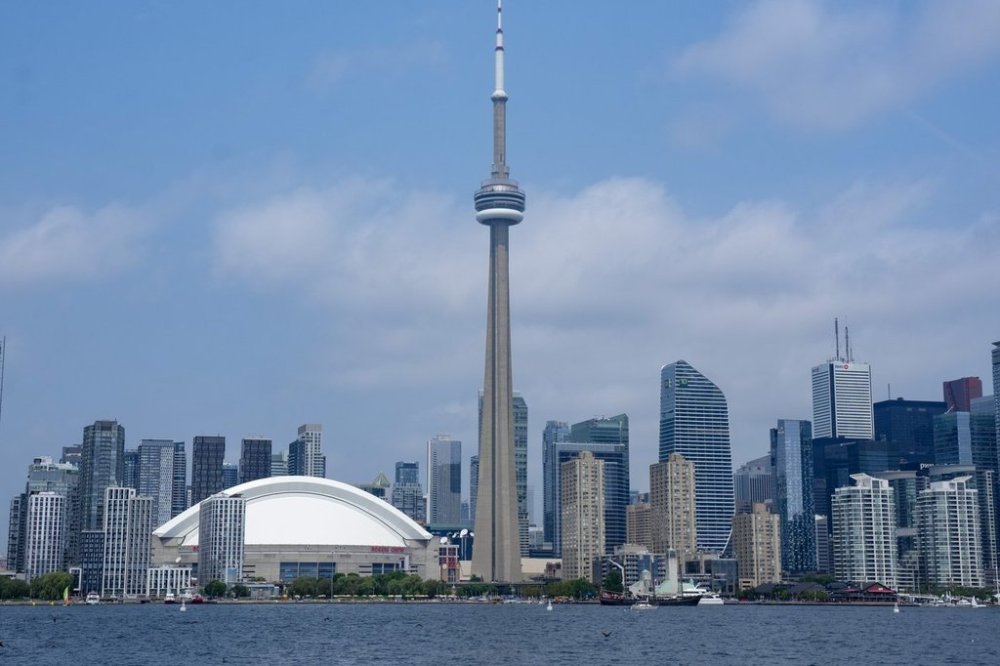Economic opportunity of climate action a focus as Toronto Climate Week launches
Advertisement
Read this article for free:
or
Already have an account? Log in here »
To continue reading, please subscribe:
Monthly Digital Subscription
$1 per week for 24 weeks*
- Enjoy unlimited reading on winnipegfreepress.com
- Read the E-Edition, our digital replica newspaper
- Access News Break, our award-winning app
- Play interactive puzzles
*Billed as $4.00 plus GST every four weeks. After 24 weeks, price increases to the regular rate of $19.00 plus GST every four weeks. Offer available to new and qualified returning subscribers only. Cancel any time.
Monthly Digital Subscription
$4.75/week*
- Enjoy unlimited reading on winnipegfreepress.com
- Read the E-Edition, our digital replica newspaper
- Access News Break, our award-winning app
- Play interactive puzzles
*Billed as $19 plus GST every four weeks. Cancel any time.
To continue reading, please subscribe:
Add Free Press access to your Brandon Sun subscription for only an additional
$1 for the first 4 weeks*
*Your next subscription payment will increase by $1.00 and you will be charged $16.99 plus GST for four weeks. After four weeks, your payment will increase to $23.99 plus GST every four weeks.
Read unlimited articles for free today:
or
Already have an account? Log in here »
TORONTO – Canada has an opportunity to leap ahead and reap the economic gains of climate action as the U.S. retreats, said several speakers at the launch of the first Toronto Climate Week on Wednesday.
“There is a massive economic opportunity here. The U.S. just left a huge leadership gap that we could fill,” said Becky Park-Romanovsky, founder and executive director of the conference.
Climate change is already hurting the economy, said federal Environment Minister Julie Dabrusin, citing a study that estimated climate-induced damages would cause a $25 billion drag on the economy this year.

Meanwhile, the economic potential in solving the problem is part of why the government is working on its climate competitiveness strategy, she said.
“We’re talking about a moral imperative, but we’re also talking about an economic imperative.”
Dabrusin, however, provided no updates on when that strategy may arrive or what it will contain, as others working in the climate space raised concerns about how slow the Mark Carney government has been in rolling out its climate plans.
“I am both still hopeful, and increasingly impatient,” said Canadian Climate Institute president Rick Smith, talking on a panel at the conference.
He said he was concerned by the growing gap between the impacts of climate change — including the equivalent of 2.5 Vancouver Islands of forests burned this year in Canada and last year’s record $8.5 billion in insured losses — and the level of ambition he’s seeing from the country.
Smith said it can be hard to look past the deluge of news coming from the U.S., but that it’s important to remember that the rest of the world is moving on with climate action.
It was also just a year ago that the concern was more on how the scale of U.S. climate spending was making it hard to compete, so the temporary reversal there is an opportunity.
“We should look at this intervening period as a moment where we can leapfrog the United States, and clearly we need improved policy to do that.”
He pointed to the need to fix carbon pricing, finalize methane regulations, get clean electricity tax investments and establish sustainable investment guidelines as some key areas overdue for action.
“There’s a short list of policies federally that would have a big catalytic impact in terms of economic prosperity,” Smith said.
Efforts to gain traction in clean technology and other climate-related industries has, however, also been hampered by the uncertainty created by U.S. policy shifts, said Peter McArthur, chair of the Ontario Clean Technology Industry Association.
Investors are hesitant to commit money given the uncertainty, helping lead to a 31 per cent drop in funding for early-stage companies compared with last year.
“It’s tough,” he said.
Changes to government funding programs (made in the wake of critical reviews of how they operated), has also made it harder for startups to secure funding, he said.
Canada needs to step up, across the economy, if it’s going to seize the moment, said McArthur.
“We’ve got to get more aggressive, more bullish, and more willing to take risks … we’ve got to get better at selling, better at doing, and if something fails, it doesn’t mean you should get fired, it might mean we learned something.”
Part of the effort to step up is organizing Toronto Climate Week, said Park-Romanovsky, with plans to run a full week of programming next June to follow on the three-day soft-launch this week.
She said the conference is an opportunity to acknowledge all the work already being done on innovation and clean tech and also to figure out how to get Toronto, and Canada, recognized as a climate hub.
“We don’t want to be this hidden gem for climate innovation anymore. The time to shine has come.”
This report by The Canadian Press was first published Oct. 1, 2025.
Note to readers:This is a corrected story. A previous version misquoted a comment from Peter McArthur.

